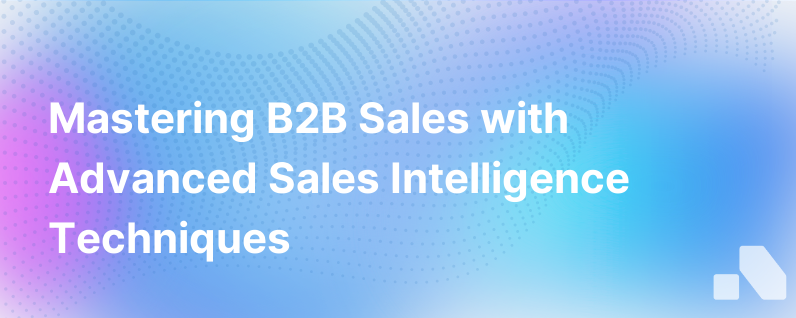Harnessing Sales Intelligence for B2B Sales
Published on November 1, 2023 by David Zhang
In today's digital landscape, the B2B sales process has evolved from a simple exchange to a complex ecosystem that demands a keen understanding of your clients' needs, behaviors, and pain points. Sales intelligence has emerged as an indispensable tool, arming sales teams with critical insights that can significantly heighten their success. Let's dive into how harnessing sales intelligence can amplify your B2B sales initiatives.
The Foundation of Sales Intelligence
Sales intelligence is an analytic approach that provides businesses a 360-degree view of their potential accounts. It encompasses a broad spectrum of data, such as prospect behavior, industry trends, and company performance, to empower sales reps with actionable and strategic information. With robust sales intelligence, the guesswork is taken out of sales, and decisions are driven by data.
Leveraging tools like CRM systems, social media platforms, company analytics, and specialized software, sales intelligence can assist teams in identifying prime prospects, nurturing leads, enhancing customer communications, and accurately forecasting sales outcomes. Integrating these insights into the sales process is crucial in pinpointing and engaging with high-value targets.
The Strategic Role in B2B Sales
Sales intelligence affects various stages of the B2B sales cycle. In prospecting, it guides reps to businesses genuinely interested or in need of their offerings. During engagement, personalized and timely interaction is crafted based on the insights gathered, significantly improving response rates.
Intelligence data is also pivotal in tailoring solutions for potential clients, demonstrating an understanding of their specific circumstances, ultimately positioning your solution as the perfect fit. As for account management, sales intelligence signals when clients may need additional resources or are ripe for upselling, playing a definitive role in expanding existing relationships.
Implementing Sales Intelligence in Your Sales Strategy
Adoption of sales intelligence begins with choosing the right tools. Prioritize platforms that are easily integrated into your sales tech stack, offering extensive insights and enabling seamless workflows for your team. The next step is to ensure your salesforce is trained and proficient in utilizing these tools to foster a culture of data-driven decision-making.
It's essential to continually refine your strategies based on the intelligence you gather and monitor. Whether adjusting your messaging for better engagement, redefining your target market or revising sales tactics to align with market trends, sales intelligence provides a feedback loop for ongoing improvement.
Overcoming Barriers
Despite its benefits, integrating sales intelligence can present challenges. One significant hurdle is ensuring data quality and accuracy. Outdated or incorrect information can lead to misguided strategies and lost opportunities. Therefore, establishing processes to regularly cleanse and update your data is ongoing.
Another issue is the complexity of integrating new tools with existing systems. It's often not just about the software but also about changing the company culture to become more data-centric. Encouraging adoption and overcoming resistance to new technologies is critical for success.
Data privacy and compliance have also become increasingly relevant. With regulations like GDPR and CCPA, it's imperative to ensure your sales intelligence practices respect customer privacy and adhere to legal requirements.
The Future of Sales Intelligence in B2B
As we move forward, sales intelligence is expected to become even more integrated into everyday sales operations, leaning heavily on artificial intelligence (AI) and machine learning to predict and guide sales engagements. The future is likely to bring even more advanced analytics, leading to hyper-personalized and sophisticated approaches to B2B selling.
The Bottom Line
Sales intelligence is more than just a buzzword; it's a transformative practice that can redefine how B2B interactions are conducted, analyzed, and improved over time. Leveraging this type of intelligence effectively can be the defining factor that sets successful B2B sales operations apart from the rest.
So, while this strategic asset in your sales arsenal requires a thoughtful approach to harness effectively, the dividends it pays in customer acquisition, engagement, and retention are undeniable. And whilst Aomni may not have been at the heart of this discussion, it's a platform designed with the understanding that strategic and intelligent sales are the cornerstone of successful B2B engagements, delivering the insights that keep you a step ahead.
Sources:
- Sales Intelligence Best Practices for 2023
- What is Sales Intelligence and How Does it Help Your Sales Success?
- Sales Intelligence: An In-Depth Look for Faster Prospecting and a Fatter Pipeline
- Increase Your Revenue with Sales Intelligence
- B2B sales intelligence: 4 ways data fuels your ABM campaigns
- Sales Intelligence: Data, Sources, Examples
- A Comparison of the Top 27 Sales Intelligence Tools for 2024